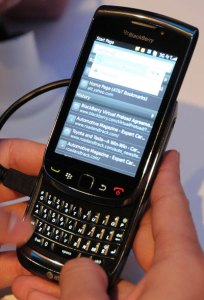
Market analysis firm conScore has released its mobile market share figures for October 2010, and the results show Canada’s Research in Motion’s BlackBerry platform still has more subscribers than any other smartphone platform in the United States. But that probably won’t be true for long: while BlackBerry lost 3.5 percent of its market share from June to October 2010, Google’s Android platform gained 6.5 percent.
Overall comScore found RIM accounted for 35.8 percent of the U.S. smartphone market (in terms of subscribers) during October 2010, while Apple came in second with 24.6 percent of the market, and was the only platform besides Android to see any growth between June and October, with an uptick of 0.8 percent. Android came in a very close third place with 23.5 percent of the market (buth with that massive 6.5 percent June-to-October growth). Microsoft and Palm rounded out the top five, with 9.7 percent and 3.9 percent of the smartphone market. To be fair, Microsoft’s Windows Phone 7 had not yet hit the U.S. market in October, and Palm’s webOS 2.0 has yet to make a broad consumer debut.
In terms of the entire phone market—smartphones and lower-powered “feature phones”—Samsung remained the top phone OEM, with phones in the hands of 24.2 percent of U.S. mobile subscribers, with LG coming in second at 21 percent, and Motorola coming in third at 17.78 percent. And while phones with Internet capabilities are all the rage, comScore found that text messaging is by far more popular than anything Internet-related on a phone: some 68.1 percent of U.S. mobile users sent text messages to another phone in October, where only 36.2 percent used a Web browser, about one third (33.7 percent) downloaded apps, and less than a quarter played games or accessed a blog or social networking site (24.2 and 23.7 percent, respectively).


